Plenary Speakers
Francisco Gabriel Acién Fernández
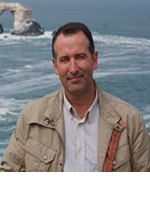 Professor of Chemical Engineering at the University of Almeria, Director of Cathedra Cajamar on Bioeconomy and coordinator of H2020 EU Project SABANA focused to the Sustainable production of biofertilizers and aquafeed from wastewater using microalgae. Main research topics includes the reuse of crops residues and biotechnology of microalgae.
Professor of Chemical Engineering at the University of Almeria, Director of Cathedra Cajamar on Bioeconomy and coordinator of H2020 EU Project SABANA focused to the Sustainable production of biofertilizers and aquafeed from wastewater using microalgae. Main research topics includes the reuse of crops residues and biotechnology of microalgae.
Prof. Acién has participated in 12 European projects in addition to 30 National projects and contracts with companies. He is vice-president of European Algae Biomass Association (EABA), member of International Society for Applied Phycology, member of Latino American Society for Algal and Environmental Biotechnology, and editor of Algal Research and RELABIAA journals, in addition to reviewer of international journals. He also collaborates with international projects as DeserBioenergy in Chile and CONACYT in Mexico aimed to develop processes for the production of biofuels from microalgae in especial locations. Major contributions on Biotechnology of microalgae field are related with the improvement of photobioreactors design, scale-up of production systems, and economic analysis of production processes. In the last time research was focused to microalgae biomass valorisation to improve the economic yield of microalgae based processes.
Michael Sauer
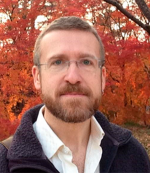 Michael SAUER is Assistant Professor at the Department of Biotechnology of BOKU – University of Natural Resources and Life Sciences, Vienna. His research aims at microbial production of base chemicals from renewable resources.
Michael SAUER is Assistant Professor at the Department of Biotechnology of BOKU – University of Natural Resources and Life Sciences, Vienna. His research aims at microbial production of base chemicals from renewable resources.
Metabolic engineering and bioprocess engineering are combined to provide microbial processes of industrial relevance. One focus is on the exploration of natural diversity to characterize and optimize natural producers. A second line of research is dedicated to the development of synthetic tools aiding metabolic engineering approaches with a focus on transport processes.
He studied biotechnology at the Swiss Federal Institute of Technology (ETH Zürich), obtained his PhD in Biochemistry from the University of Vienna, and his venia docendi (habilitation) in industrial microbiology from BOKU, Vienna.
Michele Swanson
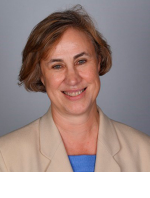 After studying at Yale and Harvard, Michele Swanson, PhD, joined the University of Michigan Medical School faculty in the Department of Microbiology & Immunology and later became Director of the Office of Postdoctoral Studies. Her laboratory investigates how metabolic cues govern virulence and resilience of the water-born pathogen Legionella pneumophila, Recently Swanson worked with an interdisciplinary team to analyze the risk of Legionnaires’ disease during the municipal water crisis in Flint, Michigan. She is also a member of the National Academies of Sciences, Engineering, and Medicine committee on Management of Legionella in Water Systems, which is advisory to the USA federal government. Dr. Swanson serves the American Society for Microbiology as President, member of the Board of Directors, co-host of the podcast This Week in Microbiology, and co-author of the ASM Press textbook Microbe.
After studying at Yale and Harvard, Michele Swanson, PhD, joined the University of Michigan Medical School faculty in the Department of Microbiology & Immunology and later became Director of the Office of Postdoctoral Studies. Her laboratory investigates how metabolic cues govern virulence and resilience of the water-born pathogen Legionella pneumophila, Recently Swanson worked with an interdisciplinary team to analyze the risk of Legionnaires’ disease during the municipal water crisis in Flint, Michigan. She is also a member of the National Academies of Sciences, Engineering, and Medicine committee on Management of Legionella in Water Systems, which is advisory to the USA federal government. Dr. Swanson serves the American Society for Microbiology as President, member of the Board of Directors, co-host of the podcast This Week in Microbiology, and co-author of the ASM Press textbook Microbe.
Mohammad J. Taherzadeh
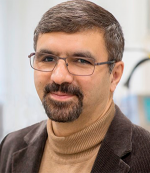 Mohammad J. Taherzadeh is full professor in Bioprocess technology since 2004 at University of Borås in Sweden and director of Research School of Resource Recovery. Prof. Taherzadeh has PhD in Bioscience from Sweden, and MSc and BSc in Chemical Engineering from Iran. He is developing processes to convert wastes and residuals to value added products with focus on pretreatment and fermentation. He has more than 260 publications in scientific peer-reviewed journals, 20 book chapters, 5 patents and 5 books. He is also editor-in-Chief of Bioengineered and Associate Editor of Bioresource Technology. More information about him is available at www.taherzadeh.se and www.hb.se/scrr
Mohammad J. Taherzadeh is full professor in Bioprocess technology since 2004 at University of Borås in Sweden and director of Research School of Resource Recovery. Prof. Taherzadeh has PhD in Bioscience from Sweden, and MSc and BSc in Chemical Engineering from Iran. He is developing processes to convert wastes and residuals to value added products with focus on pretreatment and fermentation. He has more than 260 publications in scientific peer-reviewed journals, 20 book chapters, 5 patents and 5 books. He is also editor-in-Chief of Bioengineered and Associate Editor of Bioresource Technology. More information about him is available at www.taherzadeh.se and www.hb.se/scrr
Nikos C. Kyrpides
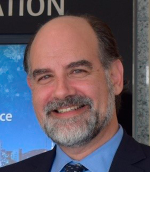 Nikos Kyrpides is a senior scientist at the Lawrence Berkeley National Laboratory. He is the Head of the Prokaryotic Super Program at the US Department of Energy Joint Genome Institute (JGI) where he also leads the Microbiome Data Science Group. Dr. Kyrpides has over 25 years of research experience in microbiome research, computational biology, bioinformatics, and data science and published more than 600 peer reviewed papers in the field. He has led the development of several pioneering data managements systems in microbial genomics and metagenomics, which are widely used in the community and have several thousand users across the world. Research in his group is focusing on Microbiome Research with an emphasis on Microbiome Data Science. Dr. Kyrpides has received several prestigious awards including the USFCC/J. Roger Porter Award from the American Society of Microbiology and the van Niel International Prize for Studies in Bacterial Systematics. He is an elected fellow of the American Academy of Microbiology and he is in the list of the world’s most highly cited scientists from 2014-2018.
Nikos Kyrpides is a senior scientist at the Lawrence Berkeley National Laboratory. He is the Head of the Prokaryotic Super Program at the US Department of Energy Joint Genome Institute (JGI) where he also leads the Microbiome Data Science Group. Dr. Kyrpides has over 25 years of research experience in microbiome research, computational biology, bioinformatics, and data science and published more than 600 peer reviewed papers in the field. He has led the development of several pioneering data managements systems in microbial genomics and metagenomics, which are widely used in the community and have several thousand users across the world. Research in his group is focusing on Microbiome Research with an emphasis on Microbiome Data Science. Dr. Kyrpides has received several prestigious awards including the USFCC/J. Roger Porter Award from the American Society of Microbiology and the van Niel International Prize for Studies in Bacterial Systematics. He is an elected fellow of the American Academy of Microbiology and he is in the list of the world’s most highly cited scientists from 2014-2018.
Keynote speakers
Alexandra Teresa Pires Carvalho
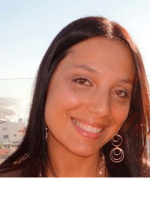 Alexandra Carvalho is a researcher at CNC and the leader of the Rational Protein Engineering group. She has a licentiate degree in Biochemistry and a Ph.D. degree in Chemistry with Maria Ramos (Porto University) in collaboration with Matthias Bickelhaupt (Vrije University). She did post-doctoral work at Porto University, Girona University with Marcel Swart and Uppsala University with Lynn Kamerlin. From 2015-2016 she worked for Almac Sciences in the development of new biocatalysts. Her group is focused on enzyme design.
Alexandra Carvalho is a researcher at CNC and the leader of the Rational Protein Engineering group. She has a licentiate degree in Biochemistry and a Ph.D. degree in Chemistry with Maria Ramos (Porto University) in collaboration with Matthias Bickelhaupt (Vrije University). She did post-doctoral work at Porto University, Girona University with Marcel Swart and Uppsala University with Lynn Kamerlin. From 2015-2016 she worked for Almac Sciences in the development of new biocatalysts. Her group is focused on enzyme design.
Title: Enzyme design for polyester synthesis.
Miguel Cerqueira
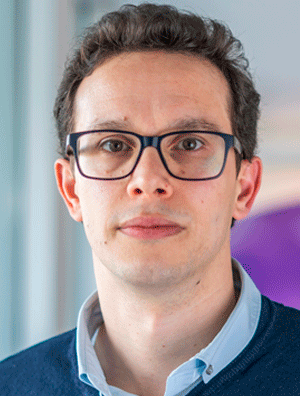 Miguel Cerqueira holds a PhD degree in Biological Engineering from University of Minho and at this moment is Staff Researcher at the International Iberian Nanotechnology Laboratory. He has expertise in the development and characterization of bio‐based nanostructures for food applications, such as food packaging, and encapsulation of functional compounds, and on the development and characterization of emulgels and oleogels for functional foods. He authored more than 90 Peer-reviews scientific articles, published more than 20 book chapters, two patents and is editor of three books. He supervised several PhD and MSc students. In 2014 he won the Young Scientist Award (sponsored by IUFoST). In 2018 he join the list of “Highly Cited Researchers” presented by Clarivate Analytics.
Miguel Cerqueira holds a PhD degree in Biological Engineering from University of Minho and at this moment is Staff Researcher at the International Iberian Nanotechnology Laboratory. He has expertise in the development and characterization of bio‐based nanostructures for food applications, such as food packaging, and encapsulation of functional compounds, and on the development and characterization of emulgels and oleogels for functional foods. He authored more than 90 Peer-reviews scientific articles, published more than 20 book chapters, two patents and is editor of three books. He supervised several PhD and MSc students. In 2014 he won the Young Scientist Award (sponsored by IUFoST). In 2018 he join the list of “Highly Cited Researchers” presented by Clarivate Analytics.
Title: “Nanotechnology in the food industry: ‘plenty of room’ to innovate”
Sónia Alexandra L. V. Mendo
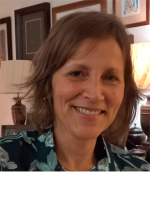 Sónia Mendo received her B.Sc. from University of Kent at Canterbury, UK, in 1989 and her Ph.D. from the University of Lisbon in 1998. She joined the Biology Department at Aveiro in 1998 and became Assistant professor with Habilitation in 2013. She is an integrated member of CESAM and the coordinator of the Molecular Biotechnology Laboratory (LBM) at UA. The research program of her group focuses on: (i) search for new peptide antibiotics (lantibiotics), ii) radioecotoxicogenetics and iii) molecular mechanisms of bacterial resistance to xenobiotics.
Sónia Mendo received her B.Sc. from University of Kent at Canterbury, UK, in 1989 and her Ph.D. from the University of Lisbon in 1998. She joined the Biology Department at Aveiro in 1998 and became Assistant professor with Habilitation in 2013. She is an integrated member of CESAM and the coordinator of the Molecular Biotechnology Laboratory (LBM) at UA. The research program of her group focuses on: (i) search for new peptide antibiotics (lantibiotics), ii) radioecotoxicogenetics and iii) molecular mechanisms of bacterial resistance to xenobiotics.
Title: “Lanthipeptides: a nature´s toolbox with a phlethora of biotechnological applications.”
Mary E. Allen
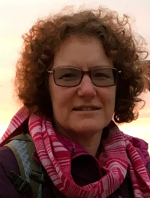 Mary E. Allen is a Professor in the Biology Department at Hartwick College, Oneonta, NY, USA where she has served as Chair of Biology and taught a variety of introductory biology and microbiology courses for diverse populations that include non-science, nursing, biology, and biochemistry majors. Mary employs high impact practices in her teaching and course design and is currently the Senior Curriculum Editor for the ASM Journal of Biology and Microbiology Education. Trained as a microbial ecologist, Mary engages her students in collaborations with Hartwick College’s Center for Craft Food and Beverage, finding solutions to technical difficulties and developing protocols to help producers in the brewing industry.
Mary E. Allen is a Professor in the Biology Department at Hartwick College, Oneonta, NY, USA where she has served as Chair of Biology and taught a variety of introductory biology and microbiology courses for diverse populations that include non-science, nursing, biology, and biochemistry majors. Mary employs high impact practices in her teaching and course design and is currently the Senior Curriculum Editor for the ASM Journal of Biology and Microbiology Education. Trained as a microbial ecologist, Mary engages her students in collaborations with Hartwick College’s Center for Craft Food and Beverage, finding solutions to technical difficulties and developing protocols to help producers in the brewing industry.
Title: Active Learning to Improve Student Learning and Faculty Engagement in the Undergraduate Science Classroom
Martha E. Trujillo
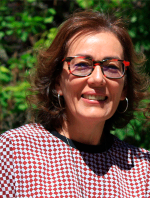 Martha E. Trujillo is Professor of Microbiology at the University of Salamanca, Spain and Vice-Dean of the Faculty of Agriculture and Environmental Sciences. She obtained her PhD in Microbial Systematics at the University of Newcastle upon Tyne (UK). Following this time, she held a postdoctoral research post at Novartis, A.G. She joined the University of Salamanca in 2002 where she leads the research group Microbial Ecology and Biotechnology. Her main research areas are actinobacterial systematics and microbial ecology with special interest in plant-actinobacteria interactions. Professor Trujillo is Editor in Chief of the International Journal of Systematic and Evolutionary Microbiology, Chair of Bergey’s Manual Trust and co-opted member of the International Committee on the Systematics of Prokaryotes.
Martha E. Trujillo is Professor of Microbiology at the University of Salamanca, Spain and Vice-Dean of the Faculty of Agriculture and Environmental Sciences. She obtained her PhD in Microbial Systematics at the University of Newcastle upon Tyne (UK). Following this time, she held a postdoctoral research post at Novartis, A.G. She joined the University of Salamanca in 2002 where she leads the research group Microbial Ecology and Biotechnology. Her main research areas are actinobacterial systematics and microbial ecology with special interest in plant-actinobacteria interactions. Professor Trujillo is Editor in Chief of the International Journal of Systematic and Evolutionary Microbiology, Chair of Bergey’s Manual Trust and co-opted member of the International Committee on the Systematics of Prokaryotes.
Title: Culture Collections and Their role in the Preservation of Biological Resources.
Isabel Gordo, IGC – Instituto Gulbenkian de Ciência
Isabel Gordo is a principal investigator at the Instituto Gulbenkian de Ciência, Portugal. She graduated in Physics and received a PhD in Evolutionary Genetics from the University of Edinburgh in 2002. Her Postdoctoral research was carried out at the Instituto Gulbenkian de Ciência where she then became leader of the Evolutionary Biology group in 2004. In 2010 she won an ERC Starting Grant and in 2015 a FCT Investigator Consolidator Grant. She founded the Portuguese Society for Evolutionary Biology, serves as panel member of the ERC grants evaluation since 2014 and was elected EMBO member in 2017.Her current research combines theoretical and empirical methods aiming at a better understanding of the major forces that shape diversity of bacteria and their resistance levels in the context of the gut microbiome. She uses Escherichia coli as a model organism of bacteria and mice as a host model system.
Pedro Leão, CIIMAR – Interdisciplinary Centre of Marine and Environmental Research, Universidade Porto
Pedro Leão heads the Cyanobacterial Natural Products Team at CIIMAR (University of Porto, Portugal). He graduated in Biochemistry at the University of Porto (2005) and obtained his PhD in the same University in 2010 where he studied the chemical ecology of cyanobacteria under the supervision of Vitor Vasconcelos. He then focused on the discovery, chemistry and biosynthesis of new natural products from marine cyanobacteria, and did postdoctoral stays at Scripps Oceanography (with Bill Gerwick) and Harvard University (with Emily Balskus). In 2017 he was awarded an ERC Starting Grant that allowed him to establish his lab at CIIMAR. His research is focused on the discovery of novel natural products and unusual enzymes.
Rodrigo Costa, IST Instituto Superior Técnico
Dr. Rodrigo Costa graduated in Biological Sciences at the Federal University of Rio de Janeiro, Brazil, in 1998 and obtained his M.Sc. degree in Ecology from this same University in 2001. He acquired his Ph.D. degree in Life Sciences from the Technical University of Braunschweig, Germany, in 2006, and was a post-doctoral fellow at the University of Groningen, The Netherlands, from 2006 to 2008. He was then awarded the Research Scientist contracts “Ciência” (2008) and “FCT Investigator” (2015) from the Portuguese Foundation for Science and Technology (FCT). During this period, he founded and led the “Microbial Ecology and Evolution Research Group” (MicroEcoEvo) at the Centre of Marine Sciences (CCMar), Algarve University, Portugal. Since April 2016, Dr. Rodrigo Costa is Assistant Professor at the Department of Bioengineering of Instituto Superior Técnico (IST), University of Lisbon. Prof. Rodrigo Costa is affiliated as Research Scientist at CCMar and at the Laurence Berkeley National Laboratory (LBNL, University of California at Berkeley, since 2019). He is member of three academic societies, an invited Editorial Board Member of Scientific Reports, and holds the position of Ambassador of the International Society for Microbial Ecology (ISME) in Portugal. Prof. Costa has authored > 70 scientific publications encompassing original research articles in international Journals, conference proceedings, book chapters and Theses. His published work has been cited over 3,600 times, featuring an h-index of 28 and an i-10 index of 40, being welcomed by multidisciplinary and top-ranked specialized Journals (Nature Communications, Nature Chemical Biology, Trends in Biotechnology, The ISME Journal, Global Change Biology, Giga Science, Environmental Microbiology, Molecular Ecology, Scientific Reports, Applied and Environmental Microbiology, FEMS Microbiology Ecology, Frontiers in Microbiology, Microbial Ecology, etc). Since 2010, he supervised > 50 individuals – among post-doctoral fellows, Ph.D., M.Sc. and undergraduate students – in the framework of >14R&D projects (10 as PI / Co-PI), gathering > 1,400 K€ in extramural research funds. His research addresses the diversity and function of microorganisms in natural and fabricated biomes – with emphasis on Eukaryote-Prokaryote symbioses studied with hi-end metagenomics approaches, their implications to host/ecosystem health and climate regulation, and potential use as renewable sources of innovative biotechnological appliances. He currently leads three R&D projects addressing the (1) microbiomes of marine sponges and corals as sources of novel drug leads and catalysts and (2) effective implementation of microbiome manipulation approaches to improve fish well-being and survival in aquaculture settings. Prof. Rodrigo Costa further collaborates as Research Scientist in several global research networks such as the “Ocean Sampling Day Consortium”, the “Sponge Microbiome Consortium” and the “Genomics Encyclopedia of Bacteria and Archaea” project. His most recent publications can be followed at https://orcid.org/0000-0002-5932-4101.
Maria Ascenção Reis, Universidade Nova de Lisboa
Maria Reis is a Full Professor in Environmental Biotechnology at FCT-UNL. Main research interests have been in the area of Environmental/Industrial BioEngineering, with special focus on the development of sustainable bioprocesses for the removal of pollutants from water and wastewater streams and for the exploitation of industrial wastes for the production of biopolymers and bulk chemicals, in the scope of circular economy. Within this research area, published more than 200 papers in scientific journals with peer review. H index 49. She is the co-author of 18 Book Chapters. Presented more than 200 oral presentations in International conferences. Is co-author of 4 National patents and 6 International patents. Coordinated 20 national and international projects (team leader), out of which 18 European Projects and 6 were co-funded by industrial companies, and participated as team member in 22 research projects. Co-supervised 30 PhD students and is currently co-supervisor of 10 PhD students. Co-supervised 15 PostDoc and is currently co-supervisor of 9 PostDoc. Her scientific work has been distinguished with several awards and she was the winner of the Solvay & Hovione Ideas Challenge SHIC’08 Prize- Solvay prize in 2008. Nominated and Elected to the Portuguese Academy of Engineering in 2009 and Elected as IWA Fellow, September 2010. She is Editor of the Water Research (Elsevier).
Raquel Sá Leão, ITQB – Instituto de Tecnologia Química e Biológica, Universidade Nova de Lisboa
Raquel Sá-Leão is Principal Investigator and Head of the Laboratory of Molecular Microbiology of Human Pathogens, Instituto de Tecnologia Química e Biológica, Universidade Nova de Lisboa.
She completed her PhD studies in Molecular Biology at Universidade Nova de Lisboa, Portugal, and at the Rockefeller University, New York under the supervision of Profs. Hermínia de Lencastre and Alexander Tomasz.
Raquel Sá-Leão currently coordinates various research projects including ONEIDA a consortium aiming to match the urgent need for effective solutions in the prevention and control of infectious diseases and antibiotic resistance (http://www.itqb.unl.pt/oneida).
Her research interests include pneumococcal ecology and how it is affected by the use of vaccines and antibiotics, a topic she will be discussing at Microbiotec19.
Joana Azeredo, Universidade Minho
Joana Azeredo is an Associate Professor with habilitation at the Department of Biological Engineering of the University of Minho and develops her research activity at the Centre of Biological Engineering, where she is a member of the direction board, leading the Biofilm Science and Technology research Group and the Bacteriophage Biotechnology Group.
Her current research focuses on interaction of bacteriophages with biofilms and development of bacteriophage based biotechnological applications for detection and control pathogens.
Joana Azeredo was graduated in 1994 as Biological Engineer from the University of Minho and obtained a PhD in Microbial Technology from the University of Minho (1998).
She developed pioneer studies in collaboration of Ian Sutherland (Univ. Edinburgh) on the characterization of the interaction of bacteriophages with biofilms and demonstrated the efficacy of bacteriophages against biofilms. She and her team have isolated and sequenced several new bacteriophages giving an important contribution to phage taxonomy and have demonstrated in vivo and in vitro the efficacy of bacteriophages and derived enzymes in controlling several human pathogens.
She has supervised 16 PhD students and lead 2 European and 7 National and Regional projects. She regularly serves as international expert project reviewer for national and international funding agencies and as peer-reviewer for international scientific journals. She has extensive publishing and editorial experience, both as a prolific author (+150 international peer reviewed papers), member of editorial boards and editor of thematic issues and books. Her work has received +5000 citations and her current h-index is 43 (Scopus, January 2019).
Isabel Sá-Correia, Institute for Bioengineering and Biosciences
Isabel Sá-Correia is Distinguished Full Professor of Biological Sciences at Instituto Superior Técnico (IST), Universidade de Lisboa, Coordinator of the Biological Sciences area of the Department of Bioenginering and the Institute for Bioengineering and Biosciences (iBB), at IST, and Member of the General Council of ULisboa. A Chemical Engineering graduate, she holds a PhD degree in the field of Microbiology (Yeast Physiology, at IST) and, as Fulbright Visiting Assistant Professor, she carried out post-doctoral studies at the University of Illinois at Chicago, Medical Center, Chicago, USA (Molecular Biology of alginate biosynthesis in Pseudomonas aeruginosa). Prof. Sá-Correia was the advisor and mentor of more than 30 PhD theses and 15 postdocs. She is the current President of the Portuguese Society of Microbiology and delegate to the Federation of European Microbiology Societies (FEMS) Council. Her research activities are in the fields of Molecular and Cellular Microbiology (yeasts and Gram-negative bacteria) and of Functional and Comparative Genomics, with a focus on Microbial Responses and Resistance to stress. Prof Sá-Correia has published over 300 articles in peer-reviewed journals (more than 5000 citations since 2014) http://scholar.google.pt/citations?user=IOqDH2sAAAAJ.
